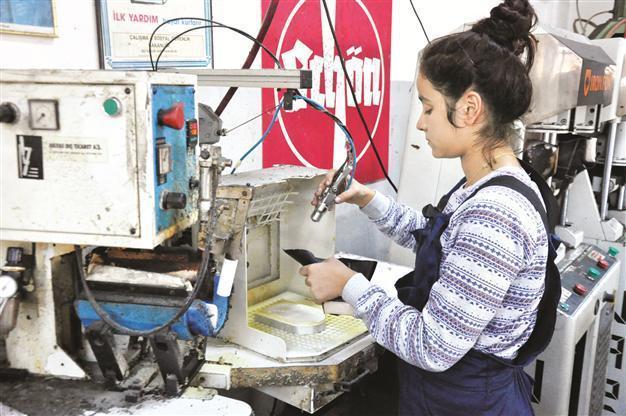Women with children are stuck at home
İpek Yezdani - ISTANBUL

AA Photo
Some 70 percent of women with children under the age of 6 are not employed in Turkey, compared to 29 percent in Europe, U.N. Women Assistant Secretary-General Lakshmi Puri has said, warning over the negative impact it could have on the country.“In Turkey, female employment is 27.1 percent according to the Turkish Statistical Institute [TÜİK]. 45 percent of young women aged 15-29 in Turkey are not receiving education, employment or training. That should be a major concern. That will hamper economic growth and prosperity in Turkey and negatively affect Turkey’s competitiveness in the future,” Puri said, speaking to daily Hürriyet ahead of the G-20 Summit to be held in the southern Turkish city of Antalya on Nov. 15-16.
“This means women and girls are tied up with unpaid care work and domestic work, and therefore prevented from education and job opportunities,” Puri said, stressing the importance of empowering women to reach those goals.
The U.N.’s “2030 Sustainable Development Goals” (SDG) will be discussed at the G-20, and Puri said the most important targets of the SDG agenda were based on gender equality and empowering women all over the world.
“One of the targets is valuing the care work and domestic work [done by women]. Since women have long been stereotyped as performing in most of the care work and domestic work, they have been prevented from education and job opportunities. They are seen as natural tasks for women. What we have been recommending in our Progress of the World’s Women Report, also in our Justice Report, is you need to reduce that burden among men at home as well as creating a care paid economy. Member states have taken a commitment to provide infrastructure and services that will result in reducing and distributing provision care services,” she said.
Puri said that for the first time in the history of the U.N., and also in the history of humanity, the international community has realized the value of gender equality and that women’s empowerment was important not for only for women and girls, but also for all of society and the economy.
“For the first time in our agenda, which is called ‘Transforming Our World - 2030 Agenda for Sustainable Development,’ we have real centering of gender equality and women’s empowerment. It says we are going to achieve gender equality and women empowerment by 2030. This determinism and confidence is a very important movement. This is a mission possible. For the first time the world and the governments are saying, ‘It is possible, we can do it and we will do it.’ This is a universal agenda; it is not about rich country, poor country. So everyone is committed to that promise,” said Puri.
Without gender equality and the realization of human rights for women and girls, no other SDG can be achieved, Puri added. “We cannot achieve any other aspect of the SDG agenda unless we have the gender equality part,” she said.
Puri said the number-one target was ending all forms of discrimination in law and practice. “If there are laws [and] policies that discriminate [against] women and girls, they are to be repealed, removed and amended. It is not enough to remove laws when there is so much inequality. For substantive equality to be achieved you need to have positive discrimination. The second target is ending all forms of violence against women,” she added.
Puri said the third target was ending and rejecting all kinds of harmful practices against women and girls, in particular female genital mutilation and forced or underage marriage.
“When a child is married there is no marriage, it is a legitimatized rape. It is a denial of her right to education [and] economic empowerment,” she said. The fourth target was related to the issue of equal participation and leadership in economic, social and public life, said Puri. “In this target we will have indicators in parliament, the judiciary, law enforcement, in all these public institutions. They should have an equal representation of women” she added.
Insurance against domestic violence is the conviction of perpetrators
“Men tend to think they have a right over a woman. In many parts of the world, they see woman as their property. This is a part of the problem and this mindset has to change,” said Puri, who also stressed the importance of the prosecution and conviction of perpetrators of violence.
“If people who commit violence get away with it, then they wouldn’t care. The best insurance against such violence is the conviction of the perpetrators. Access to justice is a very important hallmark of ending violence strategy,” she added.
Puri also mentioned the burden of proof concept should be on the perpetrator, not the victim. “In the legislation process, whether it is rape or violence, the burden of proof should be on the perpetrator; he should be responsible to prove that an act was not done, rather than - as we find in some legislations - putting the burden of proof on the victim,” Puri said.
















